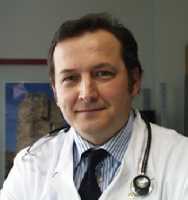04 Jan Biomarker sST2 Predicts All-Cause and Cardiac Death in Heart Failure Patients
MedicalResearch.com Interview with:
Prof. Michele Emdin, MD, PhD, FESC
Associate Professor of Cardiovascular Medicine
Director, Cardiology & Cardiovascular Medicine Division
Fondazione Toscana Gabriele Monasterio
per la Ricerca Medica e di Sanità Pubblica
CNR-Regione Toscana with the collaboration of
Dr. Alberto Aimo, MD
Institute of Life Sciences
Scuola Superiore Sant’Anna – Sant’Anna School of Advanced Studies
Pisa, Italy
MedicalResearch.com: What is the background for these meta-analyses?
Response: Soluble suppression of tumorigenicity 2 (sST2) is a novel and promising biomarker of heart failure (HF). It has been extensively studied in both stable chronic (CHF) and acute HF (AHF), demonstrating substantial potential as a predictor of prognosis in both settings (Dieplinger et al., 2015).
An International Consensus Panel (Januzzi et al., 2015) and latest American College of Cardiology Foundation/American Heart Association (ACCF/AHA) guidelines (Yancy et al., 2013) support the use of sST2 assay for risk stratification in both CHF and AHF patients. By contrast, European Society of Cardiology guidelines do not provide specific recommendations on sST2 (Ponikowski et al., 2016). Because of ambiguity due to discordant conclusions and to the absence of a thorough revision of the literature and of rigorous meta-analyses of published studies up-to-date, we felt it worthwhile to carefully examine and meta-analyze evidence supporting measurement of sST2, in order to assess the prognostic role of this biomarker in CHF and AHF. Most of the groups originally publishing on the topic all over the world and representing the Gotha of clinical research on cardiovascular biomarker, accepted to directly contribute allowing the main Authors to achieve novel information by a guided statistical reappraisal, The final results furnish clinically significant support to the use of sST2 as a risk stratification tool either in the acute or in the chronic heart failure setting.
MedicalResearch.com: What are the main findings?
Response: An exhaustive literature search allowed to identify 7 follow-up studies on CHF providing the hazard ratio (HR) and 95% confidence interval (CI) for all-cause death, 5 also reporting the corresponding data on CV mortality; the global population assessed was quite large (6,372 patients for all-cause death and 5,051 for CV death), and the median follow-up duration was 27 months. At unadjusted analysis, sST2 emerged as a predictor of all-cause and CV death, with good performance (median HR values 1.75 and 1.79, respectively).
The meta-analysis on AHF included 10 studies, considering 4,835 patients over a median 13.5-month follow-up. Plasma sST2 was predictive for all-cause death (median HR 2.46 and 2.06 for admission and discharge values, respectively), CV death (median HR 2.29 and 2.20), and the composite outcome of all-cause death or HF hospitalization (median HR 1.74 and 1.63). Additionally, discharge sST2 concentrations were predictive of HF hospitalization during follow-up (median HR 1.54).
MedicalResearch.com: What should readers take away from your meta-analyses?
Response: Plasma sST2 predicts all-cause and CV death in CHF outpatients, as well as clinically meaningful outcomes in AHF. In other words, higher sST2 levels point to a higher risk of all-cause and CV death and (in AHF) hospitalization for HF, suggesting the need for an enhanced therapeutic effort.
MedicalResearch.com: What recommendations do you have for future research on sST2 in heart failure?
Response: By design, our meta-analyses did not allow to assess the integrative clinical value of sST2 relative to natriuretic peptides or risk scores for the optimal care of patients with heart failure. It would also be crucial to evaluate whether specific action taken in response to the information conveyed by sST2 improves patient status and outcomes. The creation of multinational data repositories could allow to perform individual patient data meta-analyses, enabling us to explore these points. Large datasets would also provide the optimal setting to assess currently controversial points (such as the influence of renal function, body mass index and age on plasma sST2), and possibly also to determine the best timing for sST2 sampling in AHF.
MedicalResearch.com: Is there anything else you would like to add?
Response: These two meta-analyses are the result of a multi-national collaboration. As coordinators of this project, we would thank all the researchers helping in data collection and elaboration, who have been listed as co-Authors. Dr. Januzzi, Dr. Maisel and Dr. Bayes-Genis deserve a special mention for their invaluable contribution to the successful completion of this work. We would like to thank also the researchers from our group (Dr. Giuseppe Vergaro, Andrea Ripoli and Dr. Claudio Passino), who helped us design and carry out this research project.
No disclosures outside of those cited in the article.
Citation:
Aimo A, Vergaro G, Passino C, Ripoli A, Ky B, Miller WL, Bayes-Genis A, Anand I, Januzzi JL, Emdin M. Prognostic value of soluble suppression of tumorigenicity-2 in chronic heart failure: a meta-analysis. J Am Coll Cardiol HF. 2016 Oct 27. doi: 10.1016/j.jchf.2016.09.010. [Epub ahead of print]
Aimo A, Vergaro G, Ripoli A, Bayes-Genis A, Pascual Figal DA, de Boer RA, Lassus J, Mebazaa A, Gayat E, Breidthardt T, Sabti Z, Mueller C, Brunner-La Rocca HP, Tang WH, Grodin JL, Zhang Y, Bettencourt P, Maisel AS, Passino C, Januzzi JL, Emdin M. Prognostic value of soluble suppression of tumorigenicity-2 (sST2) in acute heart failure: a meta-analysis. J Am Coll Cardiol HF (in press).
Note: Content is Not intended as medical advice. Please consult your health care provider regarding your specific medical condition and questions.
More Medical Research Interviews on MedicalResearch.com
[wysija_form id=”5″]
Last Updated on January 4, 2017 by Marie Benz MD FAAD

